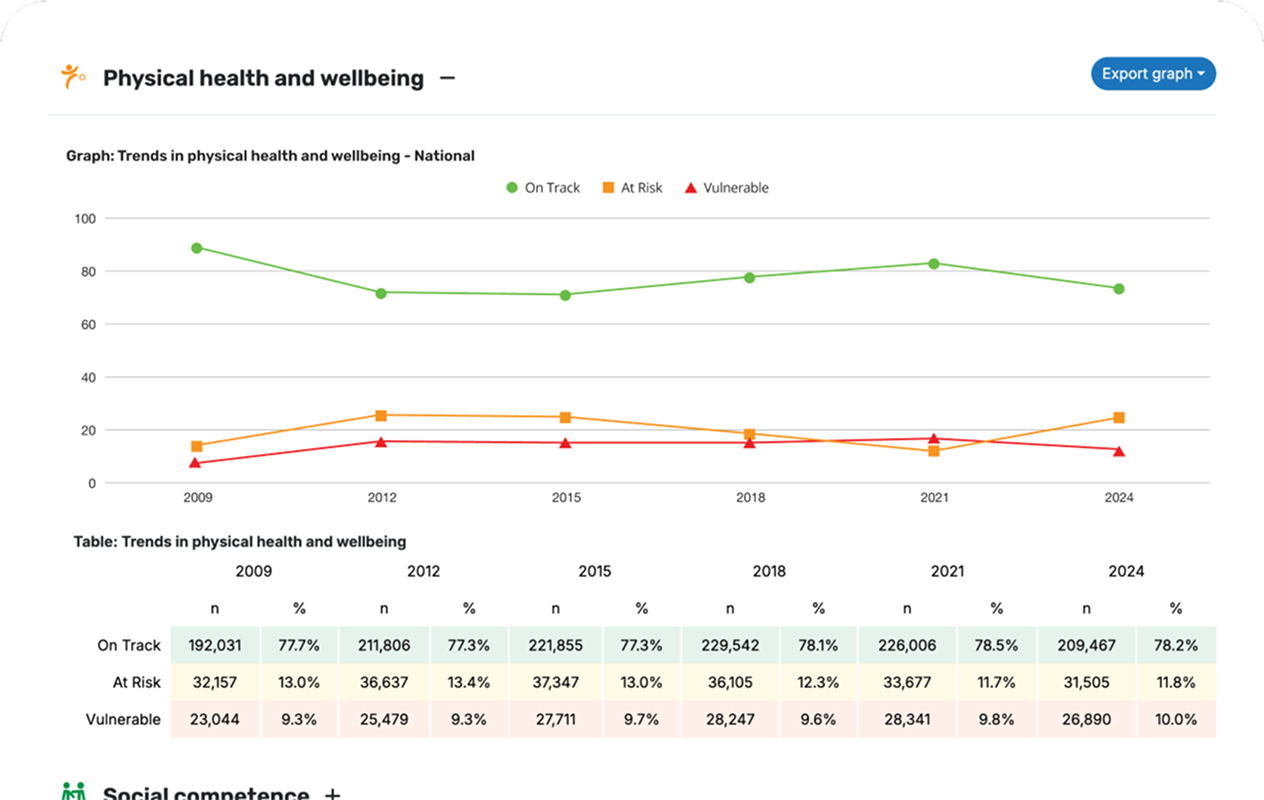.jpg?sfvrsn=9bb5b3a6_1)
Date: January 2024
AEDC Cycle: Cycle 2 (2012), Cycle 3 (2015), Cycle 4 (2018), Cycle 5 (2021)
States: ACT, NSW, NT, QLD, SA, TAS, VIC, WA
Data Linkage Project: No
Organisation: Deloitte Access Economics
This project aims to understand preschool attendance and outcomes for children with disability and from linguistically diverse (CALD) backgrounds. In particular, the key research questions of interest include:
1. Understanding the distribution of children with disability/children from CALD backgrounds through Australia
2. Understanding the rate at which children from these cohorts participate in preschool compared to all children
3. The barriers to preschool participation for children from these cohorts
4. The impact that preschool has on developmental outcomes for children from these cohorts.
Date: January 2024
AEDC Cycle: Cycle 1 (2009), Cycle 2 (2012), Cycle 3 (2015), Cycle 4 (2018)
States: NSW
Data Linkage Project: Yes
Organisation: Australian Institute of Health and Welfare
As part of the 18-month pilot phase of the National Disability Data Asset (NDDA), participating jurisdictions have committed to undertaking five priority data linkage test cases to demonstrate the potential of the linked data to inform and drive disability policy, and shape the design and implementation of an enduring asset which supports future policy and research initiatives to improve outcomes for people with disability. One of the test cases relates to the impacts of early childhood early support programs for children with developmental delay and disability (and their families). The test case is being led by the NSW Department of Education and will bring together data from the Commonwealth, NSW and the National Disability Insurance Agency. The test case aims to provide baseline data for Government policy development and to inform service, program planning and reporting on what services and supports (education, health and others) children with developmental delay and disability (and their families) have used by the time they enter school in NSW. It also aims to better understand the relationship between the use of early childhood supports, and the impact on child developmental and educational outcomes, and to inform the development of potential indicators to support the new National Disability Strategy in 2021.
Date: March 2015
AEDC Cycle: Cycle 2 (2012)
States: ACT, NSW, NT, QLD, SA, TAS, VIC, WA
Data Linkage Project: No
Organisation: La Trobe University
Permanent hearing loss is identified in approximately 1 in every 1,000 births in Australia (VIHSP, 2014). With the right kind of early intervention and support, children with hearing loss have shown communication outcomes comparable to their hearing peers (CAHE Review team, 2009). However, the impact of hearing loss on other developmental milestones, particularly social and emotional development, is less well known. This study analyses how children with hearing loss compare with their peers. Children with hearing loss will be compared to their peers with no known additional needs as well as to groups of children who can also experience developmental differences within the domain of communication, such as known language or learning delays. Results have the potential to impact on education pathways, service provision as well as communication outcomes for individual families.
Community Data Explorer
Navigate the AEDC Community Data Explorer and understand the data.
